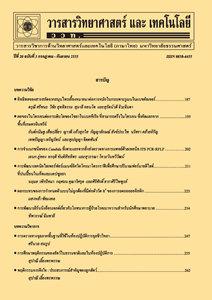อิทธิพลของชนิดปุ๋ยอินทรีย์ที่มีต่อองค์ประกอบผลผลิตและสารฟีนอลิกรวมในถั่วลิสง
Main Article Content
Abstract
Currently, consumers are turning to healthy food. Using organic fertilizer instead of chemical fertilizer is another way to produce peanuts for a healthy diet. The objective of this study was to evaluate the effect of fertilizer types on yield components and total phenolic compounds in peanut. A completely randomized design with three replications was used. There were six treatments consisting of no fertilizer, chemical fertilizer (25 kg/rai), bio-pellet fertilizer (300 kg/rai), earthworm manure (1,000 kg /rai), fermented cattle manure (1,000 kg /rai) and fermented bat manure (1,000 kg /rai). Data were collected on stem dry weight, leaf dry weight, pod number per plant, seed number per pod, seed yield per plant, 100 seed weight, shelling percentage, harvest index and total phenolic content. The results found that fertilizers were significantly different for enhancing number of pod per plant, pod fresh weight, pod dry weight, yield per plant and 100 seed weight. The fermented bat manure was shown to significantly support pod dry weight, seed yield per plant and 100 seed weight, whereas chemical fertilizer increased harvest index. Besides, total phenolic contents were not significantly different among peanuts grew up with all fertilizers. However, high values were found in those with fermented bat manure, chemical fertilizer, and no fertilizer. This indicated that fermented bat manure could enhance yield components and has a trend to increase total phenolic contents in peanut.
Article Details
References
[2] Chen, C.Y.O. and Blumberg, J.B., 2008, Phytochemical composition of nuts, Asia Pac. J. Clin. Nutr. 17: 329-332.
[3] Kayanngan, P., Jogloy, S. and Jongrungklang, N., 2559, Physiological response and yield of peanut cultivars to organic fertilizer, J. Sci. Technol. MSU. 35: 393-404. (in Thai)
[4] Ratneetoo, B., 2552, Organic fertilizer improves deteriorated soil, Princess of Naradhiwas Univ. J. 1: 1-16. (in Thai)
[5] Lin, XJ., Wang, F., Cai, H.S., Lin, R.B., He, C.M., Li Q.H. and Li, Y., 2010, Effects of different organic fertilizers on soil microbial biomass and peanut yield, 19th World Congress of Soil Science: Soil Solutions for a Changing World, Brisbane.
[6] Taokaenchan, N., Areesrisom, P., Suthon, W. and. Manoonya, W., 2561, Effect of organic fertilizers on growth and total phenolic content of Artermisia lactiflora, Agric. Sci. J. 49: 132-138. (in Thai)
[7] Sereme, A., Dabire, C., Koala, M., Somda M.K. and Traore, A.S., 2016, Influence of organic and mineral fertilizers on the antioxidants and total phenolic compounds level in tomato (solanum lycopersicum) var. mongal F1, J. Exp. Bio. Agric. Sci. 4: 414-420.
[8] El-Moniem, A., Naguib, M., El-Baz, F.K., Salama, Z.A., Hanaa, H.A.E.B., Ali, H.F. and Gaafar, A.A., 2012, Enhancement of phenolics, flavonoids and glucosinolates of Broccoli (Brassica olaracea, var. Italica) as antioxidants in response to organic and bio-organic fertilizers, J. Saudi Soc. Agric. Sci. 11: 135-142.
[9] Ibrahim M.H., Jaafar H.Z., Rahmat A. and Rahman Z.A., 2011, Effects of nitrogen fertilization on synthesis of primary and secondary metabolites in three varieties of Kacip Fatimah (Labisia pumila Blume), Int. J. Mol. Sci. 12: 52-54.
[10] Yen, G.C. and Duh, P.D., 1995, Antioxidant activity of methanolic extracts of peanut hulls from various cultivars, J. Am. Oil Chem. Soc. 72: 1065-1067.
[11] Torres, A.M., Mau-Lastovicka, T. and Rezaaiyan, R., 1987, Total phenolics and high-performance liquid chromatography of phenolic acids of avocado, J. Agric. Food Chem. 35: 921-925.
[12] Puttha, R., 2559, Effect of manure types on growth, quantitative and quality of tubers of Kaentawan (Helianthus tuberosus L.), Songklanakarin J. Plant Sci. 3: 24-29. (in Thai)
[13] Li, J., Zhu, Z. and Gerendas, J., 2008, Effects of nitrogen and sulfur on total phenolics and antioxidant activity in two genotypes of leaf mustard, J. Plant Nutr. 31: 1642-1655.


